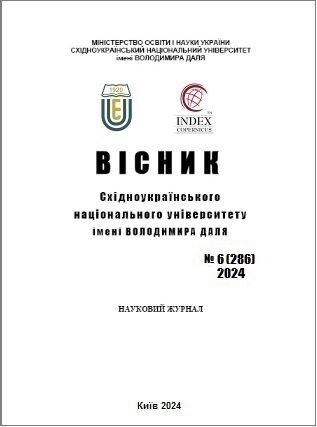Financial mechanisms of business support: factoring, forfeiting and leasing
DOI:
https://doi.org/10.33216/1998-7927-2024-286-6-148-155Keywords:
financial mechanisms, financial method, financial instruments, financial leverage, financial supportAbstract
Financial mechanisms for supporting business play a key role in ensuring its stability, development and competitiveness. Modern enterprises often face the need to ensure liquidity, optimize financial flows and minimize financial risks, which makes tools such as factoring, forfeiting and leasing extremely important for effective business management. These mechanisms allow companies to provide timely financing, reduce the financial burden and gain access to the necessary resources without significant capital investments.
The study is devoted to financial mechanisms for supporting business, namely factoring, forfeiting and leasing, which are effective tools for ensuring liquidity, risk management and financing the development of modern business in conditions of constant development. The features of the application of each of these mechanisms, their advantages and limitations in modern economic conditions are considered. The purpose of the study is to identify the features of factoring, forfeiting and leasing as levers of financial support for business.
Factoring is analyzed as a tool for improving working capital and protecting against the risks of non-payment, especially for enterprises operating on deferred payment terms. Forfaiting is considered as a mechanism for non-recourse financing of export transactions, which helps minimize the risks of international trade. The article examines the main mechanisms of factoring, its advantages and disadvantages, types and features of application in the field of business support. Particular attention is paid to the role of factoring as a tool for financial support of small and medium-sized businesses, as well as its prospects in the context of globalization and digitalization of financial services.
The article analyzes the basic principles of forfeiting, its advantages and limitations, as well as the prospects for using this tool in the context of globalization and growing requirements for the financial security of business. Particular attention is paid to the role of forfeiting in stimulating foreign trade relations and the development of international economic cooperation. Leasing is presented as a convenient method of updating fixed assets and supporting business investment activities.
The article focuses on the practical aspects of using these financial instruments in various areas of activity, emphasizing their role in strengthening the financial stability of enterprises and stimulating economic growth. The presented materials may be useful for entrepreneurs, financiers and analysts seeking to optimize financial strategies for business management.
References
1. OECD (2019), GoingDigital: ShapingPolicies, ImprovingLives, OECD Publishing, Paris, https://doi.org/10.1787/9789264312012-en.
2. MeeterenabM.,Trincado-MunozacF., Tzameret H. R., Vorleye T. Rethinking the digital transformation in knowledge-intensive services: A technology space analysis. Technological Forecasting and Social Change. 2022. Vol. 179. URL: https://www.sciencedirect.com/science/article/pii/S0040162522001639
3. Ni W. Online and Offline Integration Development of Yiwu Cross-border E-commerce in Digital Economy Era. Procedia Computer Science. 2022. Vol. 202. P. 307-312. URL: https://www.sciencedirect.com/science/article/pii/S1877050922005750
4. Penga Y., ChangqiT. Can digital transformation promote enterprise performance? —From the perspective of public policy and innovation. Journal of Innovation & Knowledge. 2022. Vol. 7. № 3. URL: https://www.sciencedirect.com/science/article/pii/S2444569X22000385
5. Oksana Desyatnyuk, Andriy Krysovatyy, Olena Ptashchenko, Olga Kyrylenko, Iryna Shevchenko and Olena Nifatova. Formation of a System for Ensuring the Development of Financial Inclusion in Conditions of Sustainable Development. [ref]: vol.22.2024. available at: https://refpress.org/ref-vol22-a2/
6. Shevchenko, I., Haraev, M., Krysovatyy, I., Kurtsev, O. (2024). The Digital Investment Platform as a Means of Forming and Implementing an Investment Project of a Railway Company. In: Yang, XS., Sherratt, S., Dey, N., Joshi, A. (eds) Proceedings of Ninth International Congress on Information and Communication Technology. ICICT 2024 2024. Lecture Notes in Networks and Systems, vol 1014. Springer, Singapore. https://doi.org/10.1007/978-981-97-3562-4_36
7. Mishchenko, D., Shevchenko, I., Babinin, D., Vdovichen, A., &Verstiak, O. Standardisation of data in logistics and business operations. Multidisciplinary Reviews, (2024. 7, 2024spe006. https://doi.org/10.31893/multirev.2024spe006
8. Шевченко І. О. Механізм розвитку маркетингового менеджменту в умовах цифровізації . Український журнал прикладної економіки та техніки. 2024. Том 9. № 4. С. 207 – 211.
9. Шевченко І. О. Переселков В. І. Цифровізація і підприємництво: основні аспекти сьогодення. Часопис економічних реформ. 2024. № 4(56). С. 115–121.
10. Shevchenko I., Rusina Y., Filipishyna L., Marushchak S., Pustovoit O. Digital trade in global markets / REICE – Revista Electrónica De Investigación En Ciencias Económicas. 2023. Vol. 11.№ 21. P. 19–32. DOI: https://doi.org/10.5377/reice.v11i21.16517 URL: https://www.lamjol.info/index.php/REICE/article/view/16517
11. Державна служба статистики URL: https://stat.gov.ua

